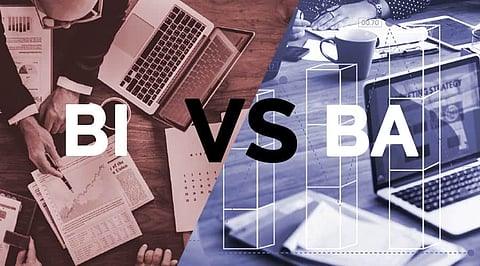

Business Intelligence is the process of collecting, examining, and storing data produced by the company for its smooth functioning. BI includes various business tools and software like spreadsheet, reporting software, monitoring software, data mining software, events management, online processing, dashboard development, etc. Companies hire professionals who they think are capable of making reports, maximizing workflow, producing informative speeches, making important decisions, and finding ways to achieve business goals. BI helps in interpreting big data, identifying new opportunities, and executing new strategies for growth. How to place the product in the market and its pricing strategies are decided through decision-making among the workers. BI combines internal and external data which gives a clear picture that cannot be acquired through single data. It helps organizations to understand the market and requirements of the product or service to the public.
Business analytics is a statistical technology with quantitative methods that companies use to gain insights, predict shortcomings, and build strategies accordingly for future growth. BA tools include forecasting analysis, predictive analysis, association and sequence identification, data aggregation, correlation analysis, factor analysis, data visualization, optimization, growth analysis, and many more. This has led to an increase in the hiring of data scientists and the need for business analytics training. BA helps in identifying the company's weak areas and working upon them. BA uses numerical analysis like predictive modeling, analytical modeling, and explanatory modeling for proper decision-making.
Both Business Intelligence and Business Analytics are important for businesses to function smoothly. BA and BI have different roles to function and increase productivity. While BI is used by companies to improve decision making and understand the work process, organizational operation, and build good employee's relations, BA has also gained popularity in recent times for analyzing the company data, its market, and past performance for predicting business trends to get a competitive edge in the future.
Join our WhatsApp Channel to get the latest news, exclusives and videos on WhatsApp
_____________
Disclaimer: Analytics Insight does not provide financial advice or guidance. Also note that the cryptocurrencies mentioned/listed on the website could potentially be scams, i.e. designed to induce you to invest financial resources that may be lost forever and not be recoverable once investments are made. You are responsible for conducting your own research (DYOR) before making any investments. Read more here.
